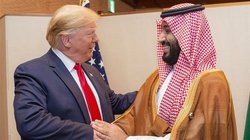 The leader of an opposition political party in Saudi Arabia says the ruling Riyadh regime heavily relies on Western support in order to survive, and that the House of Saud has no popular sovereignty as it has not been created and isn’t sustained by the consent of its people.
The leader of an opposition political party in Saudi Arabia says the ruling Riyadh regime heavily relies on Western support in order to survive, and that the House of Saud has no popular sovereignty as it has not been created and isn’t sustained by the consent of its people. RNA - The leader of an opposition political party in Saudi Arabia says the ruling Riyadh regime heavily relies on Western support in order to survive, and that the House of Saud has no popular sovereignty as it has not been created and isn’t sustained by the consent of its people.
“There is no legitimacy for the Saudi regime, because it is a system whose existence depends on external forces and that its strength and sovereignty does not arise from the political environment inside the country,” Secretary General of the Umma Islamic Party Abdullah al-Salim told Arabic-language al-Khaleej Online news website on Thursday.
Salim added, “The Saudi regime has counted on Western support in several stages of its history, ever since it was founded (in 1932) by Britain, and later on US administrations following the discovery of oil.”
The opposition leader further noted the House of Saud “should be removed by all peaceful means available within the framework adopted by the party” he heads.
Salim said the Saudi regime has been committing mistakes against the people since its establishment, arguing that the use of French mercenaries during an uprising against the rule of Al Saud in the Great Mosque of Mecca, commonly known as the al-Masjid al-Haram, in 1979 attests the failure of the regime at all local, regional and international levels.
Saudi Arabia has stepped up politically-motivated arrests, prosecution and conviction of peaceful dissident writers and human rights campaigners, in particular in oil-rich and predominantly Shia Eastern Province.
The province has been the scene of peaceful demonstrations since February 2011. Protesters have been demanding reforms, freedom of expression, the release of political prisoners, and an end to economic and religious discrimination against the oil-rich region.
According to Press TV, the protests have been met with a heavy-handed crackdown, with regime forces increasing security measures across the province.
Over the past years, Riyadh has redefined its anti-terrorism laws to target activism.
In January 2016, Saudi authorities executed Shia cleric Sheikh Nimr Baqir al-Nimr, who was an outspoken critic of the Riyadh regime. Nimr had been arrested in Qatif, Eastern Province, in 2012.